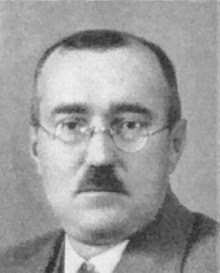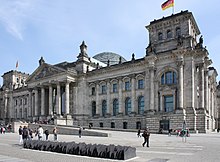Friedrich Puchta
Friedrich Puchta (born November 24, 1883 in Hof (Saale) ; died May 17, 1945 in Munich ) was a German politician of the SPD and the USPD . He is considered the most important social democrat in the Weimar Republic in Bayreuth and one of the few active resistance fighters against National Socialism in this city.
Live and act
Life in the Empire (1883 to 1919)
Puchta was born in 1883 as the son of a Jewish worker. He attended elementary school in Hof in Bavaria and then learned the textile craft , in which he worked for the next ten years. In 1903 Puchta joined the SPD and the union . In 1905 he married his wife Ottilie, from this marriage his son Erich and a daughter - the mother of SPD politician Fred Gebhardt - emerged.
From 1907 to 1908 Puchta attended the SPD party school in Berlin , where he a. a. was tutored by August Bebel and Rosa Luxemburg . He then worked as an editor in the social democratic press . In the autumn of 1908, Puchta took over the editorial management of the social democratic newspaper Fränkische Volkstribüne in Bayreuth . In the years 1911 to 1914 he was a municipal representative in Bayreuth. In addition, he worked as a teacher in economics and economic history at various adult education centers in the Kingdom of Saxony .
From 1914 Puchta took part in the First World War as a soldier . During the war, the war opponent joined the Independent Social Democratic Party of Germany (USPD), a new party that was recruited from representatives of the left wing of the SPD, which was dissatisfied with the war policy of the SPD leadership.
Weimar Republic (1919 to 1933)
After returning from the war, Puchta became a city councilor in Plauen in 1919 . In the same year he became the chief editor of the people's newspaper . He then worked as an editor in Berlin and from 1924 back in Bayreuth.
In the Reichstag elections in June 1920 , Puchta was elected as a USPD candidate for constituency 33 (Chemnitz-Zwickau) in the Reichstag , to which he initially belonged until May 1924. During this first legislative period of the Weimar Republic, Puchta returned to the SPD, whose parliamentary group he belonged to from 1922. In the Reichstag election in May 1928 , Puchta was re-elected to the Reichstag as a candidate of the SPD for constituency 29 (Franconia) , to which he belonged until June 1933. In addition to his parliamentary work , Puchta worked on the Franconian people's tribune .
In Bayreuth they desperately braced themselves against the brown tide, but had a skilfully acting opponent in the National Socialist Hans Schemm , who later became Gauleiter and Bavarian Minister of Education . Since Puchta feared that this would enhance the value of the Nazis, he shied away from directly dealing with the Nazis. However, he sharply attacked Schemm's machinations and his supporters in the press and in meetings and repeatedly warned against the National Socialists and their efforts. Therefore he was hated like no other by his right-wing opponents.
time of the nationalsocialism
After the National Socialist seizure of power in Berlin, the Social Democrats in Bayreuth did not give up and organized meetings and marches of the " Iron Front ". On February 10, 1933, Puchta spoke at a meeting in the overcrowded Sun Room on Richard-Wagner-Strasse . Among other things, he said: “We are undeterred on our way and carry our proud flags. May the enemy inject poison and hurl nasty things, and may it bark and hiss over there - we step on and look forward! There will come a day when this society is shattered and shattered on the ground. We know: the fight rises to the top. We know that this decision requires more than just attending meetings and demonstrating. We may have to give up our lives in defense of our freedom. We are determined to the last and to the extreme. "
Although his mandate was confirmed in the Reichstag election in March 1933 , Puchta could no longer take part in the vote on the Enabling Act because he was arrested four days after the election on March 10th.
In the spring of 1933, Puchta was one of the first SPD members of the Reichstag to be taken into “ protective custody ” by the National Socialists . On the night of March 9th to 10th, a total of 37 Bayreuth SPD and KPD leaders were arrested by the Nazis; the following day ten more were added. With SPD politicians like Adam Seeser , Oswald Merz and Kurt de Jonge , Puchta was initially locked up in the Sankt Georgen prison. He was then one of the first to be admitted to the Dachau concentration camp . His fellow inmate Karl Seeser reported in his notes that Puchta came to the dreaded Barrack VII, which was considered a prison camp , for no apparent reason . The next day he and several Jewish prisoners were harnessed as a draft animal in front of a heavy road roller . Seeser suspected that Puchta owed this special treatment to his intimate enemy Schemm. On May 1, Puchta was first transferred to the Munich-Stadelheim police prison.
After his release from Sankt Georgen prison in Bayreuth in July 1933, he was unemployed for a long time and then earned his living as a grocer and magazine dealer. During these difficult times, he continued to work for his banned party in illegality . First he made contact with an underground group in the northeast Upper Franconian area, whose center was in Schönwald . The local former SPD mayor Hermann Werner received from emigre comrades of exile -SPD, especially by former Nuremberg party secretary Dill, from Czechoslovakia Socialist newspapers and brochures. This material was brought to Hof, Rehau and Bayreuth via a distribution network . Friedrich Puchta was the liaison man in the Wagner city . In the summer of 1935, the underground organization was blown up and the former member of the Reichstag was arrested in July for this resistance activity along with 15 fellow activists.
In December 1935, Puchta was sentenced to two and a half years imprisonment by the Munich Higher Regional Court for "preparation for high treason ", which he served in prison in Nuremberg until February 1938 . On August 23, 1944, he was again taken into “protective custody” as part of the “ Operation Grid ” and held in the Dachau concentration camp (inmate no. 93.395). According to the concentration camp's inmate files, Puchta was in Dachau until the liberation , according to other sources he took part in one of the death marches with which the SS tried to evacuate the concentration camp shortly before the end of the war. A short time later, on May 17, 1945, Puchta died of the consequences of his concentration camp imprisonment in a hospital in Munich - Schwabing .
Puchta was buried in the Bayreuth city cemetery. His gravestone was made from the granite of the former swastika memorial on the local Luitpoldplatz.
Commemoration
Friedrich-Puchta-Straße in Bayreuth is a reminder of Puchta's life and work. In Berlin there is a memorial plaque dedicated to Puchta as part of the memorial for 96 members of the Reichstag murdered by the Nazi regime in Scheidemannstrasse.
Fonts
- Independent Social Democracy or Communist Party? , 1919.
literature
- Friedrich . In: Franz Osterroth : Biographical Lexicon of Socialism . Deceased personalities . Vol. 1. JHW Dietz Nachf., Hanover 1960, pp. 242–243.
- Martin Schumacher (Hrsg.): MdR The Reichstag members of the Weimar Republic in the time of National Socialism. Political persecution, emigration and expatriation, 1933–1945. A biographical documentation . 3rd, considerably expanded and revised edition. Droste, Düsseldorf 1994, ISBN 3-7700-5183-1 .
Web links
- Literature by and about Friedrich Puchta in the catalog of the German National Library
- Friedrich Puchta in the database of members of the Reichstag
Individual evidence
- ↑ a b c d e f g h i j Unbending fighter against the Nazis in: Nordbayerischer Kurier from 16./17. May 2020, p. 12.
- ↑ Martin Schumacher (Ed.): MdR The Reichstag members of the Weimar Republic in the time of National Socialism. Political persecution, emigration and expatriation 1933-1945. Droste-Verlag, Düsseldorf 1991, ISBN 3-7700-5162-9 , pp. 442f.
- ^ A b Franz Osterroth: Biographical Lexicon of Socialism. Deceased Personalities , 1960, p. 242.
- ↑ Bernd Mayer : Twelve people - twelve fates in April 1945 in: Heimatkurier des Nordbayerischen Kuriers, 2/2005, p. 5.
| personal data | |
|---|---|
| SURNAME | Puchta, Friedrich |
| BRIEF DESCRIPTION | German politician (SPD, USPD), MdR |
| DATE OF BIRTH | November 24, 1883 |
| PLACE OF BIRTH | Hof (Saale) |
| DATE OF DEATH | May 17, 1945 |
| Place of death | Munich |

